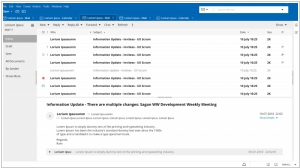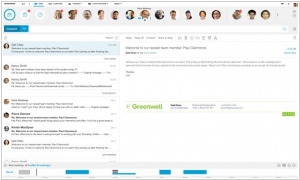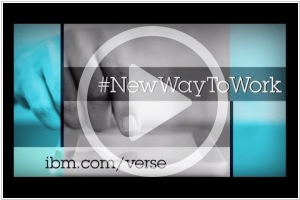HLC Notes vs Verse
September 14, 2023 | Author: Adam Levine
See also:
Top 10 Email services for Business
Top 10 Email services for Business
HLC Notes and Verse are both email clients developed by IBM, but they are distinct offerings catering to different user needs within their collaborative platform. HLC Notes, also known as IBM Notes or Lotus Notes, has been a long-standing email client known for its robust email and collaboration capabilities. It provides features such as email, calendar, contacts, and instant messaging, along with the ability to create and manage collaborative applications using the LotusScript programming language. HLC Notes is favored by enterprises that have relied on IBM's collaboration suite for many years and require a comprehensive set of tools for both communication and application development. On the other hand, Verse is a more modern and streamlined email client that focuses on social collaboration and mobile accessibility. It offers a cleaner, more user-friendly interface, and emphasizes features like file sharing, instant messaging, and activity streams to enhance team collaboration. Verse is suitable for businesses seeking a more contemporary and collaborative email experience, particularly those using other IBM Connections tools.
See also: Top 10 Email services
See also: Top 10 Email services
HLC Notes vs Verse in our news:
2018. IBM sold Lotus Notes/Domino, Websphere Portal and other software to HCL
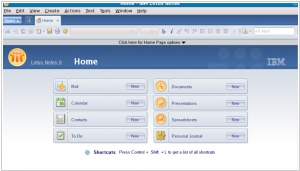
IBM is in the process of selling its renowned enterprise collaboration software, Lotus Notes, to the Indian company HCL for $1.8 billion. These products have been a significant component of IBM's enterprise business for a considerable period. However, last year, IBM began divesting the development segment to HCL while retaining control over sales and marketing. With the platform's development now outside of IBM's purview and the need for funds after a $34 billion expenditure on Red Hat, it appears that IBM decided it was no longer viable to retain any part of Lotus Notes in-house. On the other hand, HCL recognizes an opportunity to further develop the Notes/Domino business and is seizing it through this acquisition. HCL's interest in Notes/Domino surpasses what IBM has shown over the past decade, as they are heavily investing in rejuvenating the brand. Notes and Domino still maintain a presence in various enterprise sectors, particularly in EMEA (Europe, Middle East, and Africa). This strategic move aligns with IBM's shift towards advancing its cloud business in a different direction. The acquisition of Red Hat in October, in particular, demonstrates IBM's focus on embracing private and hybrid cloud deployments, whereas older software like Lotus Notes and Domino have limited relevance in this new realm.
2014. IBM also wants to fix Email
Following the examples set by Google Inbox and Microsoft Clutter, IBM is also aiming to revolutionize email with the introduction of IBM Verse. This "social mail" system is designed for businesses and seeks to reduce the time employees spend managing their inboxes. By incorporating calendars, contacts, file sharing, social updates, and other factors, IBM Verse can highlight the most important messages and provide valuable insights about the individuals involved. Over time, the system can learn and even predict which messages should be prioritized by each employee. Additionally, within an email thread, users can access a visual representation of the connections between all individuals involved, including their relationships and positions within the organization. As the system continues to learn, it can even suggest new individuals to add if it detects someone being left out. IBM Verse will launch as a beta version this month, with a full rollout, including mobile apps, expected in early 2015.
2013. IBM kills Lotus. Microsoft kills SharePoint
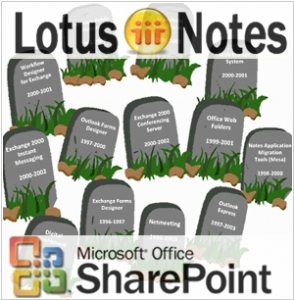
Perhaps the two most famous brands in the history of enterprise software, Lotus and SharePoint, will soon disappear. We mean brands, not specific products. Because by renaming their products, vendors try to erase the association with outdated technologies in customer brain. For example, Lotus appeared back in the 80-s years of last century. In 1995 IBM acquired Lotus Development and began selling their products Lotus Notes/Domino. In the following years most IBM collaboration systems moved under the Lotus umbrella. But last year the revolution occurred. The last child of the Lotus family - SaaS suite LotusLive was renamed to SmartCloud for Social Business. And then the name Lotus was removed from other products. The final nail was the recent launch of Notes/Domino 9.0 Social Edition (without Lotus). ***
2010. IBM unveiles SaaS version of Lotus Domino
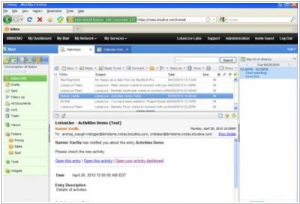
Companies like IBM and Microsoft love to confuse their customers with numerous services and titles. Not so long ago IBM launched the new mail service LotusLive iNotes, that costs $3 per month per user and provides corporate e-mail, contacts and calendar. And today IBM has unveiled another service called LotusLive Notes, that costs $5 per month and also includes e-mail, contacts and calendar. At first glance, the only difference is the price, but in fact the latest service is a multitenant SaaS version of Lotus Domino (Domino - is the name of server software in the traditional in-house Lotus Notes system). How it differs from LotusLive iNotes? ***
2010. Lotus Notes also becomes social
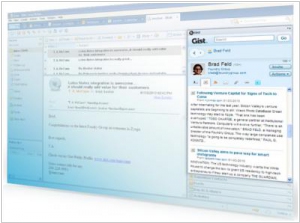
The widely used enterprise email client, MS Outlook, already incorporates a range of Enterprise 2.0 tools. It has integrated features for social networking (Xobni and Outlook Social Connector), Google Apps, Google Docs (Harmony), Remember the Milk, and more. With Outlook's ecosystem already quite diverse, developers have turned their attention to the second most popular enterprise email client, Lotus Notes. As a result, a new plugin and service called Gist has emerged, fulfilling a similar role for Lotus Notes as Xobni does for Outlook. Gist enables users to view the social profiles of their communication partners. It retrieves the latest information about individuals from Facebook, LinkedIn, and Twitter, as well as recent news about their companies from blogs and news sites. Additionally, the plugin presents all relevant correspondence and file exchanges with selected contacts in a convenient format. It's worth noting that Gist is also compatible with Outlook, GMail, iPhone, and can be accessed as a web service.
2010. Project Vulcan - the future of IBM Lotus

The geek-developer dream comes true: a full-on collaboration environment with an open API and a name right out of Star Trek. Today at the Lotushpere conference IBM unveiled Project Vulcan - the new cloud platform for collaboration and social tools, that is already compared to Google Wave. But unlike Google Wave, Vulcan - is not a separate application, but an integrated environment for all future and existing Lotus apps, including Lotus Notes and LotusLive. Vulcan will be available to developers in the second half of 2010, and meanwhile it will be available to LotusLive Labs team, which has already shown 4 new projects for LotusLive: ***
2010. IBM LotusLive sets a new SaaS record, outgoes MS Exchange

IBM has recently secured a contract with Panasonic, which entails that 300,000 employees of the company will utilize the LotusLive SaaS services encompassing email, calendar, web-conferencing, messaging, and file storage. This deployment surpasses the scale of both Google and Salesforce. Undoubtedly, this deal will invigorate the SaaS market and bolster confidence in the SaaS model, particularly given the fact that Panasonic is transitioning from Microsoft Exchange to a SaaS system. Although we were not particularly impressed with LotusLive and its email service, LotusLive iNotes, the Japanese powerhouse deemed it a superior choice compared to Exchange and Google Apps. The decisive factors behind this decision appear to be the cost (LotusLive starting from $3 per user per month) and the reputable IBM brand.
2009. IBM unveils GMail alternative. Google is happy.

When early this year IBM released their new SaaS platform, LotusLive, they promised to add Email to its suite. Today this promise is realized: the brand new SaaS email service LotusLive iNotes is available for business-users. IBM pushes it as a new alternative to Google Apps. Why Google Apps, but not GMail? Because, except the email tools, iNotes contains calendar and contact manager. IBM reps say that Google can't understand the difference between consumer web-services and business apps, and IBM has a vast experience in creating and supporting complex enterprise systems. So, it's just a question of time, when iNotes will drive away Google Apps users, moreover it costs only $36/user/year against Google's $50. ***
2009. Google unveils Lotus Notes migration tool
Today, Google Apps has introduced a new capability that enables users to migrate from IBM's Lotus Notes, a popular enterprise productivity app. This syncing tool empowers customers to seamlessly transfer their email, calendar, and contacts from Notes to Google Apps. The installation and configuration process for multiple users can be completed in under 30 minutes. The migration is user-friendly, allowing users to continue using Notes without any downtime during the migration process. Furthermore, customers have the flexibility to migrate multiple offices simultaneously or individually, and centralized event logging facilitates efficient management and monitoring of migrations across various Domino servers and sites. Google emphasizes that the significant portion of the business email market, approximately 17%, currently utilizing Lotus Notes, can achieve substantial cost savings by transitioning to Google Apps.
2009. IBM Announces Lotus Notes ActiveSync Support For iPhone
rephrase in one paragraph: IBM just announced Lotus Notes ActiveSync support will be released later this year. The code is already live, and was demonstrated in a seminar earlier today at Lotusphere. This is native integration with the iPhone–within the native mail, calendar, and contacts. Previously, iPhone users were forced to use the mobile Safari browser to access the Notes Web Access interface. Lotus is playing catchup with Microsoft, who released push e-mail for Microsoft Exchange in March 2008. No news yet on Android support, though Ed Brill, IBM Director of Messaging, said few customers are requesting Android support. Similarly, nothing was said about supporting the new Palm Pre platform.

